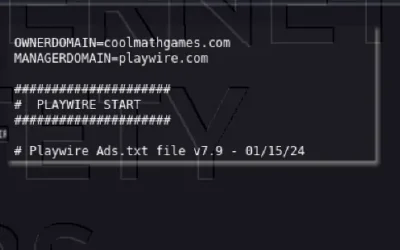Today, we are excited to announce our latest research exposing the massively networked personal information sharing happening between and across identity resolution and customer data platforms that has been hiding in plain sites for over 10 years. These industries are...
Research

MOST RECENT POST
The Worldwide Web of Commercial Surveillance: Identity Resolution & Customer Data Platforms
Today, we are excited to announce our latest research exposing the massively networked personal information sharing happening between...
Do SDKs Represent Actual Network Traffic in EdTech Apps?
Jun 26, 2024 | Research, Spotlight
1. Background In 2022, Internet Safety Labs (ISL) conducted an extensive benchmark of EdTech apps used in schools across the United...
ISL Finds Location-Based Advertising on Kids’ Site CoolMathGames.com
May 8, 2024 | Research, Spotlight
Last year, Internet Safety Labs (ISL) observed that CoolMathGames.com website (from CoolMath.com, LLC [referred to as “Cool Math”], owned by Sandbox Group) contained location-based behavioral advertisements. Using the Federal Trade Commission’s guidelines on a “child-directed” website, ISL believes CoolMathGames.com may fall under the protections afforded by the US Children’s Online Privacy Protection Rule (COPPA).
ISL Unveils Cutting-Edge Data Privacy Research Tools
Apr 23, 2024 | Research
ISL is pleased to announce the publication of the following research tools: Company Risk Dictionary, SDK Risk Dictionary, and ...
ComScore Cross-Site Tracker Found in PBSKIDS.org
Jan 22, 2024 | Research
Updated 1/22/24 We’re happy to report that the ScorecardResearch tracker has been removed from the PBSKids.org website. We...
Another School District Hacked
Nov 16, 2023 | Research
Two of the districts covered in our 2022 benchmark find themselves victims of recent data breaches at the hands of the same entity,...
42 States vs. Meta: Schools are Unwitting “Pushers” – 91% of Schools Have Facebook Accounts
Oct 26, 2023 | Research
Prompted by the news of this lawsuit, we tallied how many of the schools in our 2022 EdTech benchmark had Facebook, Instagram or...
We are monitoring and buying dangling domains to keep people and businesses safer online
Jul 7, 2022 | Research
Dangling domains present massive ongoing safety harm to people, businesses, governments, and institutions. We observed the unique harms of dangling domains during our K12 edtech research last year, and decided to act to raise the issue and encourage others to do the same.
What if people could send legally binding Information Sharing Agreements to businesses
Jun 14, 2022 | Research
The Research Project Part of our work at Internet Safety Labs is to assess the practicalities of safer technology for the mutual...
FBI releases 2021 Cybercrime Report highlighting magnitude of Business Email Compromise (BEC) risks
Apr 14, 2022 | Research
Dangling domains dangerously threaten more and more people each day, including students and parents at K-12 schools.
People Don’t Understand the Purpose of Privacy Policies and Terms of Service – New Research Published
Jan 24, 2022 | Research
Any visit to a website, app download, purchase of a digital service, or use of new software involves legal policies. People typically encounter both a privacy policy and Terms of Use or Terms of Service (TOS/TOU) policy. But do they understand what functions these two types of policies serve? It seems they don’t.
What is Respectful Use of Location Information? New Me2BA Research Published
Nov 22, 2021 | Research
As we’ve been performing independent product audits over the past year and a half, we received some push-back on our passing criteria related to the automatic translation of IP address to geographic location. Vendors felt that automatically calculating the user’s geographical location was, in fact, a benefit. However, in our specification, that behavior will receive a failing score. At an impasse, we decided to conduct some validation testing with Me-s.


